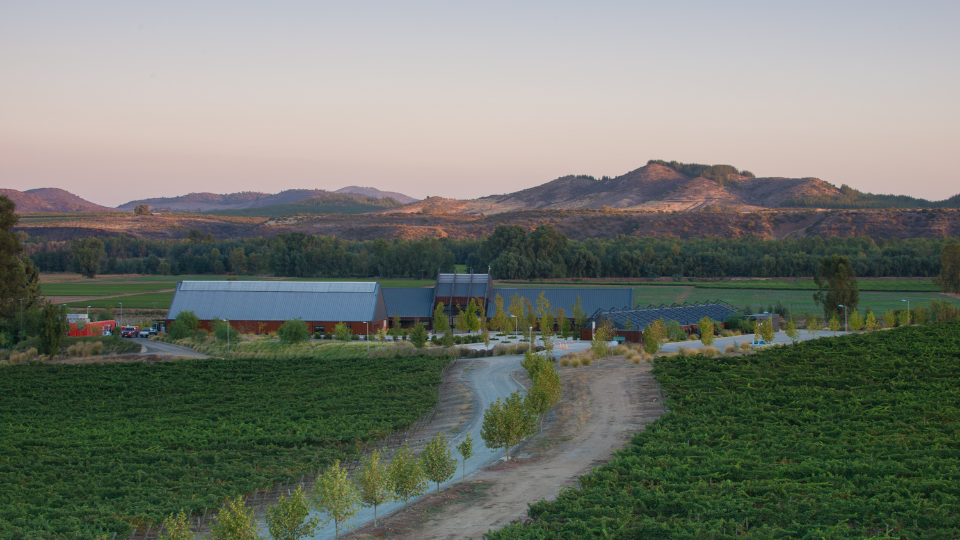- Innovation
- March 16th, 2023
Papers by CRI researchers are published on important scientific platform
Sebastián Vargas and Rosa Roa were published for their important research on topics related to sustainability, circular economy, and vineyard water management.
Three scientific papers by researchers from Viña Concha y Toro´s Center for Research and Innovation (CRI) were published on the Bio Web Conferences platform, an open access digital journal. These publications are part of the presentations made at the 43rd World Congress of Vine and Wine.
The Strategic Program “Sustainability & Circularity” led by Rosa Roa, Ph.D., and Researcher in Molecular Biology, published two papers which you can read here and here. A paper associated with the Strategic Program led by Sebastián Vargas, R+D+i Leader in Viticulture and Enology, called “Climate Change and Wine Quality”, was published and can be read here.
To learn more about the importance of these papers, we talked with Rosa and Sebastián to learn about their process and the contribution of these publications to the community.
What is the importance and relevance of where these papers are being published?
Sebastián: The articles are published on an open access platform, which unlike other scientific journals where you have to pay for the article or have a subscription, this one allows you to view and download the articles in their entirety. This is very relevant since it increases the visibility of the article, the number of readers and the type of readers. In this sense, this type of journal makes it easier for articles to be read by agronomists and the public in the industry, as opposed to paid journals that are normally only accessed by universities.
What does this mean as a contribution to the community or general knowledge?
Sebastián: In the case of my article, it moves the knowledge barrier a little more to the front regarding what we know about grapevines and how they use water; and how the way we irrigate vineyards impacts this dynamic. Today we know that when we keep plants very comfortable hydraulically, they lose the ability to control their water status well, as opposed to plants that are subjected to short periods of controlled deficit, which become better at controlling their water status.
In other words, if I irrigate a lot I make the plant act as if it will never lack water, becoming more sensitive to the lack of irrigation or to eventual droughts, on the other hand, the plants that we adapt slowly through controlled deficit irrigation are capable of modifying their behavior and to avoid an eventual drought in a better way.
Rosa: For the publications associated with compost, we are providing evidence about the feasibility of using winery waste in the vineyard itself, including the use of sludge from the treatment plant as an alternative for composting mixed with pomace. I would like to highlight the collaboration with the Viña Cono Sur and Viñedos Emiliana team, which together with the Universidad Católica del Maule made it possible to carry out this research.
What does this mean for Viña Concha y Toro and the CRI?
Sebastián: For Viña Concha y Toro, the knowledge we disseminate enables us to improve our practices, be more efficient in the use of resources, and move toward the limits of knowledge. As a CRI, publishing these results allows us to validate with third parties the quality and impact of our research, which in turn enables us to advance our vision of becoming one of the leaders in applied R+D for the wine industry at the international level.
What does it mean to you to have these papers published?
Sebastián: Publishing a paper is always a source of pride, as it validates all the work behind the R+D projects we execute, allows us to position ourselves and also to be sure that the direction we have taken at the research level is the appropriate one.
I would like to emphasize that the publication in question originates from all the work done by Nicolás Osorio during his residency period at the CRI. Nicolás did his thesis under my tutelage focused on these issues, trying to answer these questions and looking for the applied sense of them. Today Nicolás is a technical agronomist at the Lourdes Vineyard and continues to advance in his professional development, which makes us very happy because it makes us feel that we are also supporting the company in identifying and training talent. Talents that are trained within the company in areas of interest to the company.



